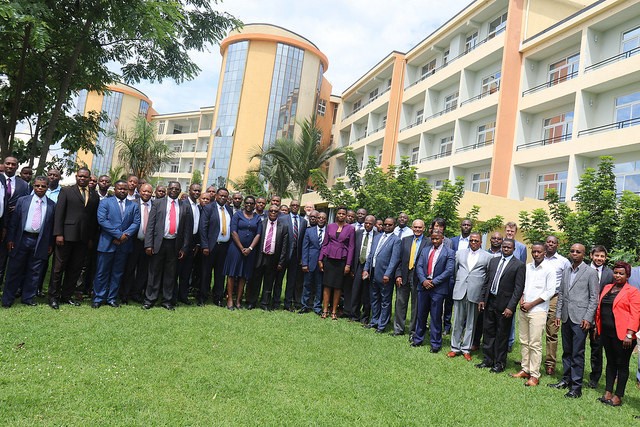The 12th Annual General Meeting of the Eastern and Southern Africa Water and Sanitation (ESAWAS) Regulators Association was held in Nyamata, Rwanda, from 26th to 29th November, 2018. The meeting was hosted by the Rwanda Utilities Regulatory Authority at the La Palisse Hotel in Nyamata, Rwanda, under the theme “The Regulatory environment for accelerating access to WSS services with focus on sanitation and climate resilient systems: leaving no one behind”
The three-day meeting which drew over 30 participants was attended by the seven of the ten members of ESAWAS, as well as representatives from the Blantyre Water Board, the Zanzibar Water Authority (ZAWA), the Moshi Water Supply and Sewerage Authority (WSSA) of Tanzania, Climate Resilience Infrastructure Development Fund (CRIDF), Agencia de Desenvolvimento Economico da Província de Manica (AdeM) of Mozambique, Water and Sewerage Company (WASCO) of Lesotho, Lusaka Water and Sanitation Company (LWSC), experts from the University of Kampala and the E-WASH project in Nigeria, and Water and Sanitation for the Urban Poor (WSUP).
Local representation was also from Pit Vidura and COPED.
The opening was officiated by a representative of the Rwanda Utilities Regulatory Authority (RURA).
The meeting begun with welcoming remarks by the Director General of RURA followed by a speech from the Chairperson of ESAWAS. In his opening statement, the Chairperson of ESAWAS said that ESAWAS had continued to grow not only in terms of members, but also partnerships and that in the year 2018 alone, ESAWAS had established four critical partnerships that will ensure it has a regional, Africa-wide and global reach. He stated that ESAWAS had signed three memoranda of understanding with the African Ministers’ Council on Water (AMCOW), Water and Sanitation for the Urban Poor (WSUP) and the Climate Resilient Infrastructure Development Facility (CRIDF). He further stated that ESAWAS had also successfully been awarded a major grant by The Bill & Melinda Gates Foundation to execute a project for regulation of inclusive sanitation service provision. He noted that these partnerships are a testament of ESAWAS’ growth and recognition by stakeholders of the value and impact the organization can have through mutual collaboration. In touching on the theme, he stated that the theme of this conference was chosen on the realisation that achieving SDG6 requires an inclusive urban sanitation approach that combines regulation of both sewered and non-sewered (onsite) sanitation service provision. He added that the organization’s hope was that at the end of the two-day deliberations, concrete measures that can be adopted and adapted by different stakeholders to enhance regulation of sewered and non-sewered sanitation services and increase resilience of water supply systems would be formulated.
The meeting was structured around the theme “The Regulatory environment for accelerating access to WSS services with focus on sanitation and climate resilient systems: leaving no one behind” included presentations on:
- Accelerating access to WSS services with focus on sanitation: The case for Regulation
- Inclusive sanitation service delivery- the Utility Perspective
- Faecal sludge management in low-income areas
- Solid Waste Management service delivery
- Inclusive Citywide Sanitation: Route to sustainable access to safe sanitation
- Adopting an appropriate service delivery and regulatory framework
- Climate Change and impact on WSS service delivery
- Climate Change and impact on WSS service delivery- The case of Maputo, Mozambique
- Mainstreaming Climate Change in regulation
- Water Safety Plans
- Good practice of NRW management
- Benchmarking in Malawi a tool to monitor performance for water utilities
- ESAWAS 4th Regional Benchmarking Report: Highlights
- Sharing experiences as the best performing water utility in the 2016/17 period
